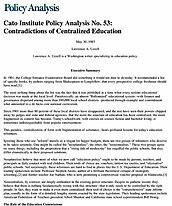In 1901, the College Entrance Examination Board did something it would not dare to do today. It recommended a list of specific books, by authors ranging from Shakespeare to Longfellow, that every prospective college freshman should have read.[1]
The most striking thing about the list was the fact that it was published at a time when every serious educational decision was made at the local level. Paradoxically, an almost “Balkanized” educational system–with finance and governance dispersed among more than 100,000 local school districts–produced through example and commitment what amounted to a de facto core national curriculum.
Since 1901 more than 80 percent of these local districts have disappeared, and the rest have seen their powers chipped away by judges and state and federal agencies. But the more the structure of education has been centralized, the more fragmented its content has become. Today’s schoolwork, with courses on science fiction and bachelor living, is sometimes indistinguishable from popular entertainment.
This paradox–centralization of form with fragmentation of substance–bears profound lessons for today’s education reformers.
Ignoring those who use “reform” merely as a slogan for bigger budgets, there are two groups of reformers who deserve to be taken seriously. One might be called the “neopluralists”; the other, the “neocentralists.” These two groups agree on many things, including the proposition that a “rising tide of mediocrity” has engulfed the public schools. But they differ dramatically in their proposed solutions.
Neopluralists believe that most of what we now call “education policy” ought to be made by parents, teachers, and principals in daily contact with real children. Their tools of choice are vouchers, tuition tax credits, and “alternative” public schools. Not surprisingly, these reformers are hard to find in places like the U.S. Department of Education. Their leading spokesmen include Professor Stephen Arons, author of a brilliant theoretical critique of monopoly schooling,[2] and former teacher Joe Nathan, who is now promoting a controversial voucher proposal in Minnesota.[3]
Neocentralists, by contrast, are deeply embedded in the existing power structure. Despite its pathetic record, they believe that there is nothing fundamentally wrong with this structure–that it only needs to be controlled by the right people. In fact, they want to make it even more centralized: their tool of choice is the “comprehensive” state reform plan, usually in the form of a detailed, lengthy statute enacted by the state legislature. Their leading spokesmen include American Federation of Teachers president Albert Shanker and California state school superintendent Bill Honig.
About the Author

This work is licensed under a Creative Commons Attribution-NonCommercial-ShareAlike 4.0 International License.
